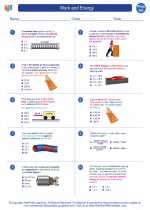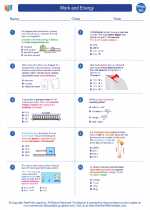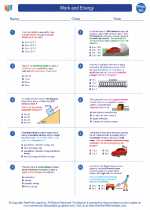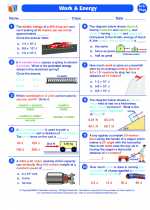Work and Energy
Definition of Work: In physics, work is done when a force acts on an object to cause a displacement. Mathematically, work is defined as the product of the force and the displacement in the direction of the force.
Formula for Work: The work done (W) by a force (F) on an object moving a displacement (d) is given by the formula: W = F * d * cos(θ), where θ is the angle between the force and the displacement vectors.
Units of Work: The SI unit of work is the joule (J), which is defined as the work done by a force of one newton acting over a displacement of one meter in the direction of the force.
Energy: Energy is the ability to do work. It exists in various forms such as kinetic energy, potential energy, and thermal energy.
Kinetic Energy: The kinetic energy of an object is the energy it possesses due to its motion. It is given by the formula: KE = 0.5 * m * v2, where m is the mass of the object and v is its velocity.
Potential Energy: Potential energy is the energy stored in an object due to its position or state. The potential energy of an object near the surface of the Earth is given by the formula: PE = m * g * h, where m is the mass, g is the acceleration due to gravity, and h is the height of the object above the reference level.
Conservation of Energy: The total mechanical energy of a system (the sum of its kinetic and potential energies) remains constant if the only forces acting on the system are conservative.
Work-Energy Theorem: The work-energy theorem states that the work done on an object is equal to the change in its kinetic energy. Mathematically, it can be expressed as: W = ΔKE, where W is the work done and ΔKE is the change in kinetic energy.
Study Guide
- Understand the concept of work and its mathematical definition.
- Learn about the different forms of energy, including kinetic and potential energy.
- Study the units of work and energy in the SI system.
- Understand the principle of conservation of energy and its applications.
- Learn how to apply the work-energy theorem to solve problems involving the change in kinetic energy.
- Practice solving numerical problems related to work and energy to strengthen your understanding of the concepts.
By mastering the concepts and principles of work and energy, you will be able to analyze and solve a wide range of problems related to the motion and interactions of objects in the physical world.
.◂Physics Worksheets and Study Guides High School. Work and Energy

 Worksheet/Answer key
Worksheet/Answer key
 Worksheet/Answer key
Worksheet/Answer key
 Worksheet/Answer key
Worksheet/Answer key
